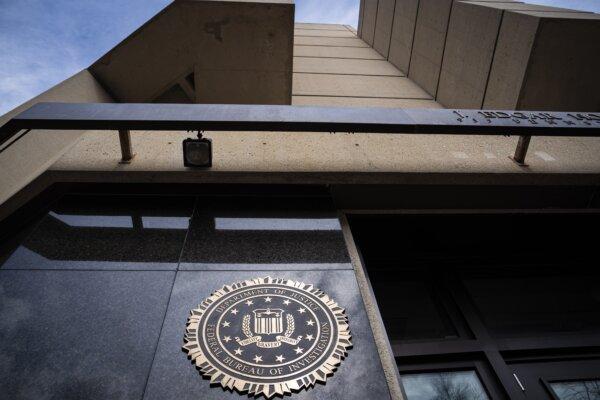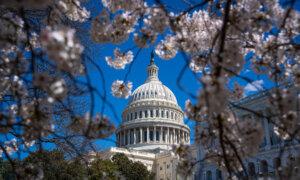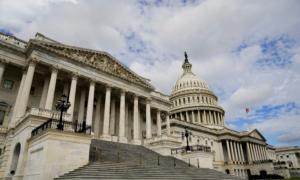A series of amendments to the bill could represent a stunning rebuke to the US surveillance state.
Lawmakers will move forward today with a high-stakes proposal to reauthorize a controversial spying power that has ignited sharp disputes and drawn bipartisan battle lines in Congress.
The authority in question, Section 702 of the Foreign Intelligence Surveillance Act (FISA), is one of several post 9/11 surveillance authorities that have come under scrutiny as some lawmakers have tried to reclaim our civil liberties lost in the 2000s.
House Speaker Mike Johnson (R-La.) is expected to bring Rep. Laurel Lee’s (R-Fla.) “Reforming Intelligence and Securing America” Act to the floor for a vote this week.
To begin that process, the House Rules Committee today will markup a bill that would reauthorize Section 702 while making minimal reforms to the system.
However, several proposed amendments could substantially broaden the scope of the bill’s current reforms, forming a stunning rebuke of the surveillance state and the intelligence practices of the past two decades.
The markup will gear the bill up for a final vote on the House floor, where it’s far from guaranteed to pass.
Ms. Lee’s bill would reform the bill’s controversial Section 702, an authority passed in 2008 that allows intelligence officials to gather information on foreign actors working outside of the United States.
At least, that’s what the rules are supposed to be.
However, since the bill was last reauthorized by Congress narrowly in 2018, a series of abuses have come to light that have thrown the future of the entire process into question.
What’s in the Reform Bill?
In response to these and countless other reported abuses, Ms. Lee’s bill would make some changes to how information is collected and the safeguards around such actions.
It would primarily strengthen requirements to “ensure that applications to the Foreign Intelligence Surveillance Court … that target United States persons are accurate and complete.”
It also strengthens penalties for illegal queries, imposing a fine or up to 10 years in federal prison for violations.
Finally, it would make it easier for Congress to exercise oversight of the program.
The legislation would also green light the program to continue for another five years.
But privacy advocates have bristled at the bill, which they feel doesn’t go far enough to address the causes brought to light over the past several years.
What Warrants a Warrant?
In December, lawmakers punted the FISA issue to this month due to longstanding disagreements between House Intelligence Committee Chairman Mike Turner (R-Ohio) and House Judiciary Committee Chairman Jim Jordan (R-Ohio) on whether a warrant should be required to query Americans’ data.
Mr. Turner and the Intelligence Committee, which is much more privy to classified information collected from Section 702 and other sources than much of the rest of Congress, has pushed for any FISA renewal not to require a warrant.
This group has argued that requiring a warrant to “unmask” the private data of American citizens would be too burdensome for intelligence agencies to follow and could pose a national security risk.
Mr. Jordan, who leads the House Judiciary Committee and its Subcommittee on the Weaponization of the Federal Government, has led another faction of privacy advocates and civil liberty hawks that have demanded a warrant requirement.
This group has argued that the Fourth Amendment of the United States Constitution, which protects Americans’ property and persons from “unreasonable search and seizure” in the absence of a warrant, is clear: intelligence agencies need a court’s permission to collect information on Americans, even in the name of national security.

The issue has united an otherwise deeply ideologically-divided Judiciary Committee, offering the rare spectacle of an issue that Mr. Jordan and Ranking Member Jerry Nadler (D-N.Y.) agree on.
These divides caused another FISA bill to be pulled from a scheduled vote in February.
Notably, Ms. Lee’s bill does not currently include a warrant requirement. A bipartisan quartet of lawmakers is seeking to change that during the Rules Committee hearing.
Under an amendment proposed by Reps. Andy Biggs (R-Ariz.), Jerry Nadler (D-N.Y.), Ben Cline (R-Va.), and Pramilla Jayapal (D-Wash.), a warrant would be required to query U.S. citizens’ communications in most circumstances.
Rebuking the Surveillance State
During their hearing on the bill today, Rules Committee members will vote on this and a series of other amendments related to strengthening privacy on both FISA and several other expansive surveillance rules.
These proposals will need to pass the Rules Committee with majority support to be brought to the House floor for a final vote.
Should they be added to the legislation, the amended bill could represent a stunning rebuke of the surveillance state by Congress.

Several would make further reforms to the FISA process as a whole.
One such amendment, submitted by Rep. John Rose (R-Tenn.), would require the Director of National Intelligence to conscript people authorized to handle classified data to witness FISA queries throughout the process.
Another amendment from Mr. Rose would cut the extension from five years to two years.
Mr. Rose also submitted an amendment that would grant members of Congress the right to attend hearings in the secretive Foreign Intelligence Surveillance Court (FISC), which oversees FISA requests.
An amendment put forward by Rep. Jerry Carl (R-Ala.) would require the FBI to provide a list of the names of all U.S. persons queried to both the House and Senate Intelligence Committees.
A related amendment offered by Rep. Chip Roy (R-Texas) would require that the numbers of these queries also be reported, as well as requiring again that members of Congress be allowed to sit-in on FISC proceedings.
An amendment sponsored by Mr. Cline, Mr. Biggs, Rep. Sheila Jackson-Lee (D-Texas), and Rep. Darrell Issa (R-Calif.) would prohibit the intelligence community from resuming the collection of “abouts” information—a form of collection that could include targeting someone who was merely mentioned by a target of Section 702 queries.
Others seek to ensure that Section 702 can’t be used as a political tool.
These proposals would also seek to limit the FBI’s ability to target members of Congress under Section 702 after a Republican congressman said he believed the FBI spied on him.
Each amendment was submitted by Rep. Andy Ogles (R-Tenn.).
One would require the FBI to notify the Gang of Eight, a coalition of House, Senate, and Intelligence Committee leadership, when they query a sitting member of Congress. Another would require that member also be notified when the FBI waives the requirement to get that member’s consent.

During the Crossfire Hurricane investigation, the FBI targeted Carter Page, an adviser to then-candidate Trump, under FISA Section 702.
Other proposals relate to the broader practices of the intelligence community.
An amendment proposed by Rep. Zoe Lofgren (D-Calif.) would restrict warrantless surveillance of American citizens under Executive Order 12333, which was signed by President Ronald Reagan and provided grounds to vastly expand the scope of U.S. surveillance. The amendment would also mandate reporting for violations of the requirements.
A bipartisan amendment submitted by Rep. Warren Davidson (R-Ohio), Ms. Jayapal, Mr. Jordan, Ms. Lofgren, Mr. Biggs, and Mr. Nadler would prohibit law enforcement from purchasing the communications and location data of U.S. citizens from third-party sources.
The amendment comes after the FBI was discovered to have purchased such information from some social media and tech companies.
What’s Next?
With the contents of the final package uncertain, and with members of Congress so deeply-divided on the issue, it’s unclear what the final package will look like or if it will pass.
Mr. Johnson, for his part, has urged passage of Ms. Lee’s bill.
A warrant requirement or other wide-reaching changes to intelligence practices could draw the ire and opposition of Intelligence Committee members and national defense hawks.
Likewise, failure to broaden the scope of the bill’s reforms could alienate members of the Judiciary Committee and other privacy hawks.
The final shape of the House package will depend on the votes of the Rules Committee and, if passed there, the rest of the House.
The bill will also face challenges in the Senate, where members like Sens. Josh Hawley (R-Mo.), Dick Durbin (D-Ill.), and Ron Wyden (D-Ore.) have been fiercely critical of intelligence agencies’ abuse of Section 702.
Just like in the House, national defense hawkishness and civil liberty concerns will clash in the Senate, where single members have far more power than in the House to stall legislation.
President Joe Biden will also need to sign any bill sent to him by Congress.
Once an opponent of Section 702, then-Sen. Biden voted against the creation of the program in 2007, calling it “unconstitutional.”
But since taking office, he’s been a staunch supporter of Section 702, and his administration has urged Congress to reauthorize the authority.
Original News Source Link – Epoch Times
Running For Office? Conservative Campaign Consulting – Election Day Strategies!


